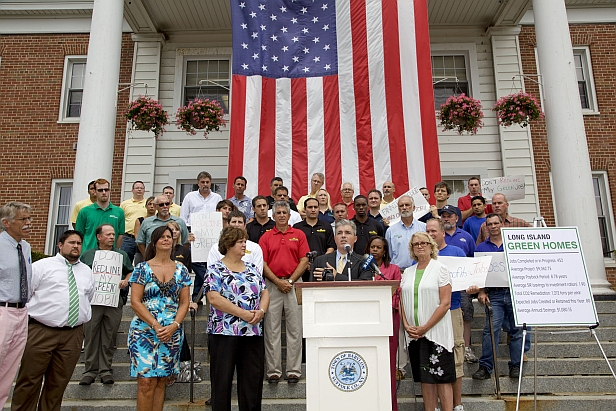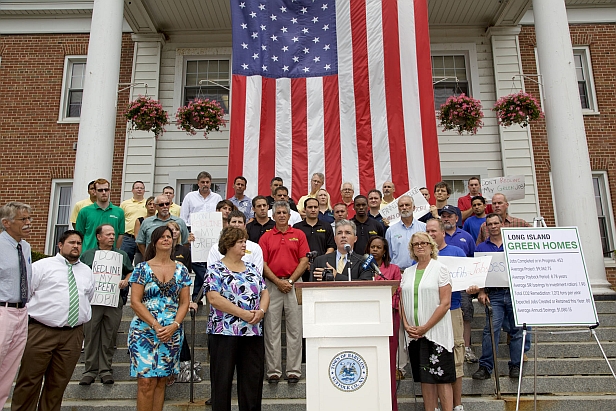Here’s the latest in the dispute with Fannie Mae and Freddie Mac over Property Assessed Clean Energy (PACE), a finance tool that helps homeowners cut energy waste:
 Babylon, N.Y., Supervisor Steve Bellone tells Fannie and Freddie to stop hating on his town’s clean-energy program at a rally with local building workers and homeowners.Courtesy Town of BabylonTwo years ago, the town of Babylon, N.Y., started Long Island Green Homes, a program that helps residents pay for home-energy improvements through the Property Assessed Clean Energy (PACE) model. It has since enabled some 300 Babylon property owners to invest more than $3 million in retrofits that cut waste — throwing a lifeline to the area’s building contractors in the process.
Babylon, N.Y., Supervisor Steve Bellone tells Fannie and Freddie to stop hating on his town’s clean-energy program at a rally with local building workers and homeowners.Courtesy Town of BabylonTwo years ago, the town of Babylon, N.Y., started Long Island Green Homes, a program that helps residents pay for home-energy improvements through the Property Assessed Clean Energy (PACE) model. It has since enabled some 300 Babylon property owners to invest more than $3 million in retrofits that cut waste — throwing a lifeline to the area’s building contractors in the process.
Now town leaders want to make clear how those businesses and homeowners are threatened by Fannie Mae and Freddie Mac’s opposition to PACE programs. On Tuesday, Babylon leaders, homeowners, and building workers held a rally to show their anger and signal their intent to file suit over the issue.
“We wanted to say, ‘Here’s the impact of what you did with the flick of a pen,'” Dorian Dale, energy director for Babylon’s town supervisor, said in an interview.
“The majority of [contractors’] work is coming through this program at this point. If we had responded to Fannie and Freddie’s edict like everyone else is doing, putting our program on hold, these guys could be out in unemployment lines. We want to demonstrate the real-world impact of these high-level decisions.”
Dale said the town is working on plans to sue Fannie, Freddie, or the Federal Home Finance Agency, their regulator, in federal court. It’s talking to Environmental Defense Fund attorneys about how best to craft a lawsuit. (The California Attorney General’s office has also indicated it may sue.)
The town of 200,000 has so far not suspended its program, as San Francisco, Boulder County, Colo., and most other municipalities with PACE programs have done. But it’s facing pressure to do so. A recent letter from FHFA suggested the mortgage giants could penalize all borrowers in municipalities that use PACE, even property owners who never use the finance tool. Alyssa Katz explains in The American Prospect:
The regulators announced strict guidelines that force localities into a corner. Cities can continue to offer PACE, but then Fannie and Freddie must impose stricter lending standards on all local borrowers — even those who never intend to take out PACE loans — that will disqualify many applicants and properties that would otherwise be eligible for a mortgage. In effect, the new guidelines force mayors and city councils to choose between promoting energy efficiency and improving the health of their already battered real-estate markets.
Dale said Babylon refuses to make that choice by suspending Long Island Green Homes. “We are putting people to work,” he said. “We feel we have an obligation to these contractors. And we believe that Fannie and Freddie have overstepped their bounds. This is federal fiat versus local law.”
He distributed a sheet of talking points that puts the conflict in even stronger terms:
Now faceless bureaucrats at Fannie Mae and Freddie Mac think they can render asunder this most potent of jobs creation programs with the stroke of pen; the working men and women of Long Island will not allow this venal and reckless bureaucratic assertion to stand. Fannie & Freddie already had a ham-fisted hand in our economic melt-down; now they propose to block our recovery.
Babylon’s program works a little differently from other PACE programs. Most programs tack the cost of home improvements onto property-tax bills, spreading out the cost over time and handing it off to a new owner if the property is sold. Babylon’s program adds the cost to monthly solid-waste bills — billing property owners about $90 a month for an average of 8.5 years, Dale said. The town runs the program through its solid-waste reserve fund, expanding the definition of “waste” to include energy waste, he said.
If borrowers fall behind on payments, the delinquent sum appears on their property-tax bills. That’s the part that concerns Fannie and Freddie, because tax assessments are paid off before mortgages if a homeowner defaults.
Dale said the town is careful to fund only the most cost-effective improvements, such as insulation, sealing, and new furnaces. It avoids rooftop solar arrays and new windows, which take longer to pay for themselves.
“We run exactly the kind of responsible program they are ostensibly asking for,” he said. “We have disciplined measures running extremely cost-effective savings-to-investment ratios. We have substantive criteria for accepting people into the program. And to date we have no delinquencies.”
Long Island Rep. Steve Israel (D) and other members of Congress are considering introducing legislation to resolve the dispute, but there’s no guarantee a bill would pass through Congress’s busy schedule any time soon (or ever).
“We absolutely believe that the only effective response is a legal challenge,” Dale said.



